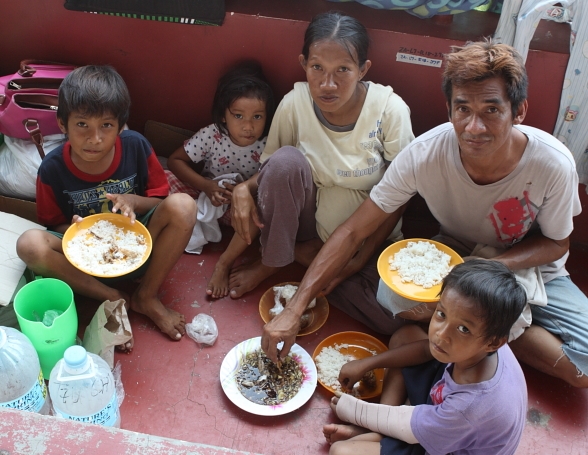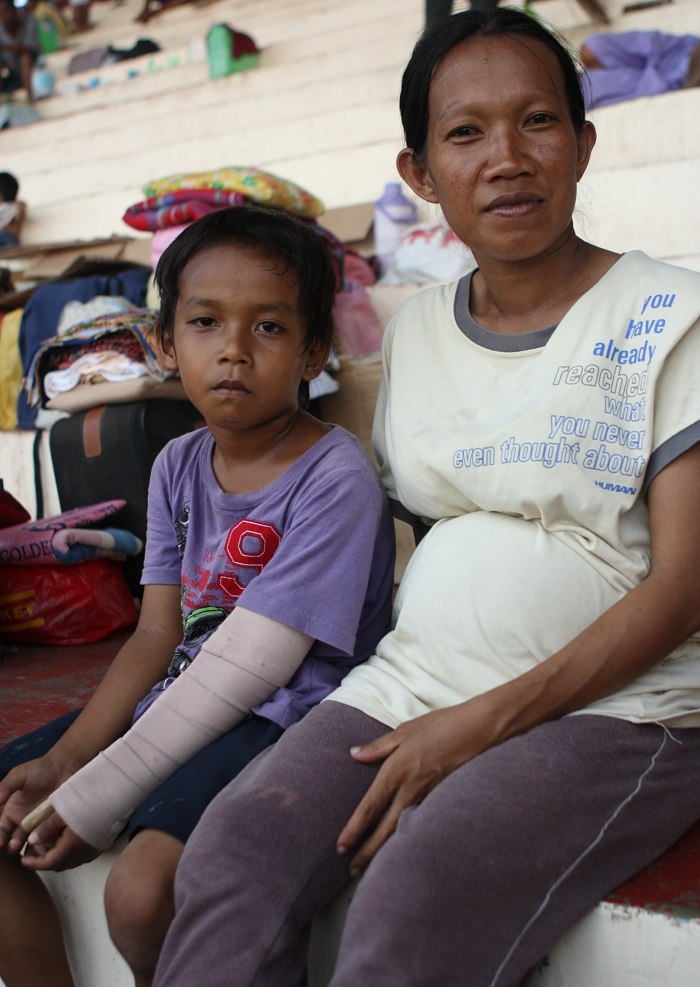Adarna is a mythical bird in 18th century Filipino literature whose song is believed to restore health and whose droppings are believed to turn people into stones. Across the Philippine cultural landscape, the Adarna bird is an icon used to represent good health and good fortune.
For the past two weeks, heavily pregnant Adarna, 29, her husband and four children have been huddled among the bleachers at the biggest evacuation center in Zamboanga City, Mindanao, in the southern Philippines – the Joaquin F. Enriquez Memorial Sports Complex.
Displaced by conflict between the Moro National Liberation Front (MNLF) and the Armed Forces of the Philippines, they joined more than 100,000 people forced to seek shelter in evacuation centers set up throughout the city.
Eight months’ pregnant and as yet unable to return to the family home they were ordered to evacuate when the fighting began in Barangay Santa Barbara, she was unsure what would happen when the time came for her to give birth: “Hindi ko po alam (I do not know)”.

As she had seen happen to pregnant women on a number of occasions in the past fortnight, she envisioned that she, too, would have little choice but to deliver her child in the bleachers and hope that help would be on hand. CFSI informed her of the Department of Social Welfare and Development (DSWD) help desk that had been set up in the middle of the football field where she could also undergo a pre-natal check-up.
Adarna’s husband Taraji said there was little to do in the evacuation center but line up to receive cooked food, which was readily available thanks to the DSWD “access card” they had received. However, the vast numbers of people in the evacuation center meant long waits of at least an hour, often under a scorching sun.
As Taraji spoke, commotion erupted about 200m away; a man beat his nine-month pregnant wife when she became faint while queuing in the noon heat for food, forcing her to leave the queue and thus their spot in line. In rage, he threw her into the bleachers. She was later taken to hospital.
The day also marked happier occasions. It was the birthday of the youngest of their four children, who range in age from four to nine. A birthday song resounded around the surrounding bleachers, joined by other children and displaced people.

Adarna, however, was concerned by her children’s lack of activity and their inability to attend school. They were unable to take books and school materials with them when they fled their home.
She called to one of her sons and showed CFSI his bandaged arm, which he had injured when he fell while playing on the steps of the bleachers. He was not alone; walking around the evacuation center, CFSI saw a number of children with such injuries and dressings.
For Adarna and Taraji, their sole wish is to return to their home. In the interim, they hope that life in the evacuation center improves for their children. Despite the difficulties they face, Adarna remains optimistic and believes that good luck will come their way. After all, she is named after the mythical bird of good fortune.
CFSI is organizing child-friendly spaces for children like Adarna’s who need safe places for rest and recreation. CFSI has also mobilized its own social workers and community volunteers to help displaced communities recover emotionally from their deeply stressful experience. At present, CFSI is continuing to mobilize resources to address other critical needs.

